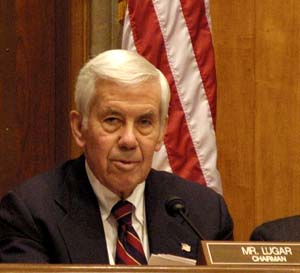
Will the new von der Leyen Commission deliver on climate policy?
Yesterday, during its first plenary session, the newly elected European Parliament confirmed Ursula von der Leyen as President of the European Commis...
News

Publish date: November 11, 2005
News
FFVs can use both regular gasoline and E-85 renewable fuel (motor fuel with 85 percent ethanol content). This capability would ensure access to an important alternative to foreign petroleum in the future as the nations renewable fuels industry continues to expand rapidly, the statement said.
Flexible Fuel Vehicles play an important role in increasing our use of renewable fuels and decreasing our dependence on foreign oil. Americas insatiable appetite for oil places our nation in a precarious situation of reliability on regions that have become increasingly hostile to us, said Lugar.
This bill would complement the exciting advances in the energy bill that Congress passed earlier this year that more than doubled the production and use of domestic renewable fuels. Passage of this legislation would send an important signal to the market that renewable fuels will be fully embraced by our nation.
The bill would require 10 percent of vehicles sold in the United States be FFVs within 18 months of its passage as law. The requirement would increase by 10 percent for each subsequent model year resulting in all new vehicles being FFVs within ten years.Earlier this year, Lugar led 21 bipartisan Senators in introducing the Fuels Security Act to more than double the production and use of domestic renewable fuels including ethanol, biodiesel and fuels produced from cellulosic biomass. This legislation laid the groundwork for the renewable fuels section of the energy bill that passed the Congress in July 2005.
Costs and availability
At present there are some 4 million cars on US roads that can use E-85, and the estimated sticker price of an average automobile produced to use both fuels will rise an average of only $200, according to the National Ethanol Vehicle Associations web site.
Daimler-Chrysler has been producing vehicles that can run on E-85 since 1998 and will introduce five new models in 2006. Ford has been producing them since 1999, with five new models to hit the market in 2006.
Other major auto makers producing cars that run on both fuels are Isuzu, Mazda, General Motors, Mercedes, Mercury and Nissan, says the National Ethanol Vehicle Association. In Scandinavia, Saab has considerably boosted its own sales by introducing the duel fuel vehicles.
Dealerships selling the dual fuel cars, however, are located only in a handful of US states, primarily on the East Cost from Maine to Maryland, in the southern states of Arkansas, Louisiana and Arkansas, as well as in Alaska. These states are also the only states that offer E-85 filling stations.
As former chairman of the Agriculture, Nutrition and Forestry Committee, Lugar initiated a biofuels research programme to help decrease US dependency on foreign oil.
He also authored and passed the Biomass Research and Development Act of 2000, which remains the nations premier legislation guiding renewable fuels research. Lugar also has co-authored and supported legislation to dramatically increase the use of renewable fuels in all U.S. vehicles.
Svend Soeyland reported from Washington, D.C., and Charles Digges reported from Oslo.

Yesterday, during its first plenary session, the newly elected European Parliament confirmed Ursula von der Leyen as President of the European Commis...

From July 1st, 2024, to December 31st, 2024, Hungary is holding the Presidency of the Council of the European Union (EU), following Belgium’s tenure....

In October 2023, Bellona Europa announced a new FedEx-backed initiative Ports2Decarb – a project aiming to maximise the role of European sea and rive...

Bellona, together with other 29 members of the industrial carbon management community and umbrella organisations, express its support to the inclusio...
Get our latest news